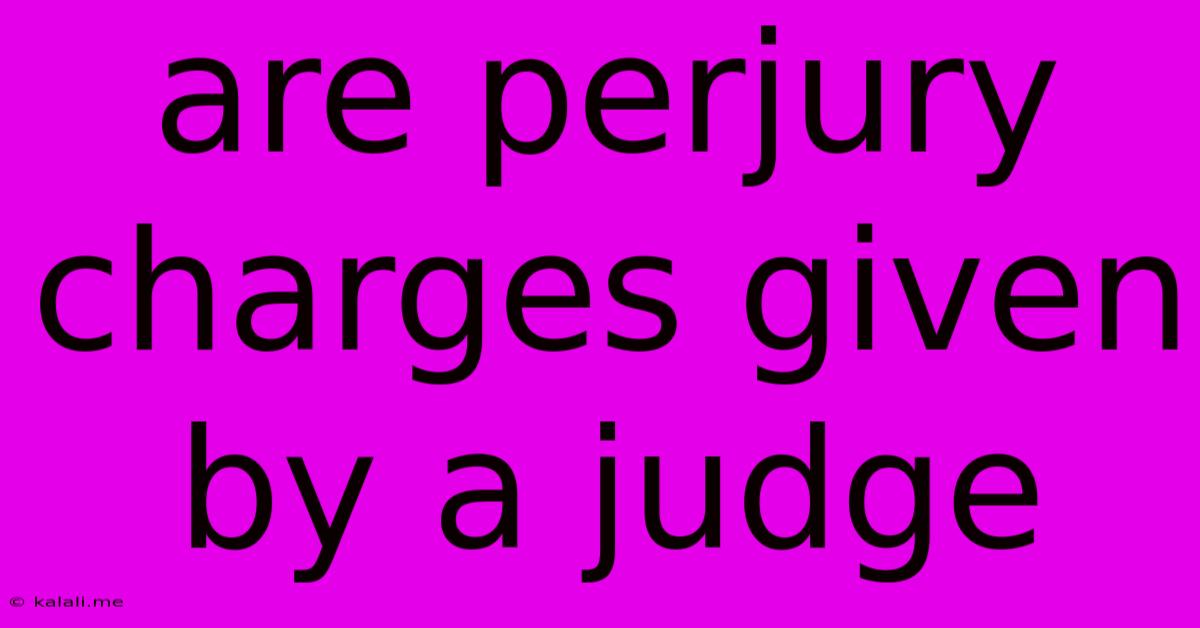Are Perjury Charges Given By A Judge
Kalali
Jun 02, 2025 · 3 min read

Table of Contents
Are Perjury Charges Given by a Judge? Understanding the Perjury Process
Are perjury charges given by a judge? The short answer is no. Judges do not directly file perjury charges. This crucial aspect of the legal process often causes confusion. This article will clarify who brings perjury charges and the process involved, explaining the roles of judges, prosecutors, and the grand jury. Understanding this process is vital for anyone concerned with perjury and its consequences.
Perjury, the act of lying under oath, is a serious offense with significant legal ramifications. While a judge presides over the trial and ultimately decides the sentence if a conviction occurs, the process of initiating perjury charges involves several key players.
Who Brings Perjury Charges?
The responsibility of bringing perjury charges rests primarily with prosecutors. They are the legal representatives of the state or government and have the authority to investigate potential instances of perjury and decide whether to file charges. The prosecutor's decision is based on evidence, witness testimonies, and the overall strength of the case.
In some jurisdictions, a grand jury may be involved. A grand jury is a panel of citizens who review evidence and decide whether there is enough probable cause to indict someone for a crime, including perjury. If the grand jury finds sufficient evidence, they issue an indictment, which formally charges the individual with perjury.
The Judge's Role in Perjury Cases
While judges don't file charges, they play a critical role throughout the perjury process:
- Presiding over the trial: If perjury charges are filed and the case goes to trial, the judge presides over the proceedings. They ensure fairness, rule on evidentiary matters, and instruct the jury on the law.
- Determining sentencing: If a defendant is found guilty of perjury, the judge determines the appropriate sentence, which can range from fines to imprisonment.
- Assessing witness credibility: During the trial, the judge observes the witnesses and may play a role in assessing their credibility, though the jury ultimately decides the facts of the case.
Understanding the Evidence Required for Perjury Charges
Successfully prosecuting a perjury case requires strong evidence demonstrating that the defendant:
- Made a false statement: The statement must be demonstrably untrue.
- Made the statement under oath: The false statement must have been made in a legal proceeding, such as a trial, deposition, or grand jury testimony.
- Knew the statement was false: Prosecutors must prove the defendant intentionally lied, understanding the statement's falsity.
The burden of proof rests entirely on the prosecution to prove these elements beyond a reasonable doubt.
The Severity of Perjury Charges
Perjury is a serious offense, carrying substantial penalties. The specific penalties vary based on jurisdiction and the circumstances of the case, but generally include significant fines and imprisonment. Furthermore, a conviction for perjury can severely damage a person's reputation and future opportunities.
In conclusion, judges do not initiate perjury charges. This responsibility lies with the prosecutor, potentially involving a grand jury's indictment. Judges play a vital role in the subsequent trial and sentencing, but their involvement begins after the charges are filed. Understanding this process is essential for navigating the complexities of the legal system surrounding perjury accusations.
Latest Posts
Latest Posts
-
No Water Pressure In House With Well
Jun 04, 2025
-
Why Doesnt My Cat Like To Be Held
Jun 04, 2025
-
How To Put Dots Between Words On Phone
Jun 04, 2025
-
How To Change A Dewalt Drill Bit
Jun 04, 2025
-
How Did Eleven Lose Her Powers
Jun 04, 2025
Related Post
Thank you for visiting our website which covers about Are Perjury Charges Given By A Judge . We hope the information provided has been useful to you. Feel free to contact us if you have any questions or need further assistance. See you next time and don't miss to bookmark.